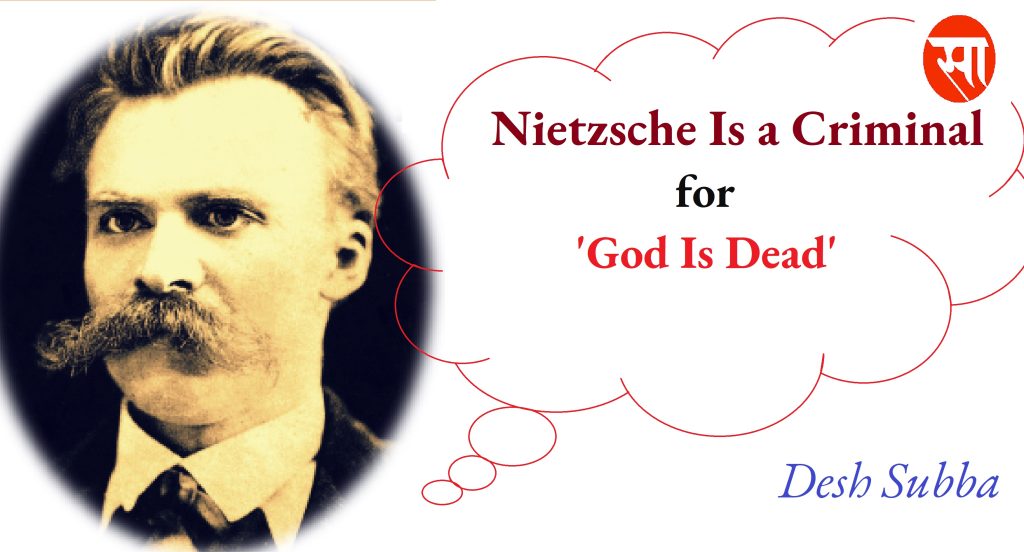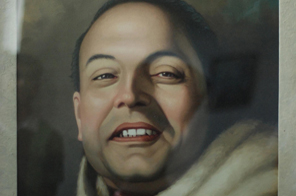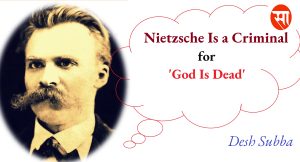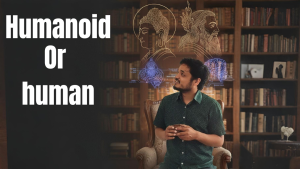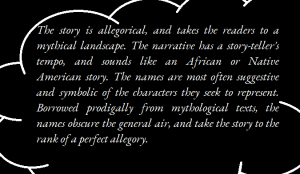Desh Subba
God is innocent;
Nietzsche declared His death.
A ghost lurks behind the scapegoat;
The scapegoat represents humanitarian bad faith.
The madman jumped into their midst and pierced them with his eyes. “Whither is God?” he cried; “I will tell you. We have killed him-you and I. All of us are his murderers. God is dead. God remains dead. And we have killed him (Nietzsche, The Gay Science p. 181).
Jackal howling scholar parrot and sing, ‘God is dead, God is dead,’ yet no one has truly examined it. In The Gay Science, he declares the God is death in aphorisms numbered 108, 125, and 343. It is time for a groundbreaking exploration of Nietzsche’s legacy, a legacy that has too long victimized our deepest beliefs and cast them into the abyss of life’s labyrinth.
‘God is dead’ represents the development from the ‘death of Greek tragedy,’ ‘Great Pan is dead,’ and ‘tragedy is dead’ (The Birth of Tragedy). Following its birth, many ‘deaths’ emerged: the author is dead, history is dead, discipline is dead, and more. Some authors cleverly twisted words, proclaiming the ‘death of the author,’ the ‘end of history,’ the ‘end of narration,’ and many other ends. All of these are scapegoating ideas. No one is dead; somehow, they gained popularity from the notion of an iconic idol-crashing death or dead. There is a key insight in philosophy and writing: those who possess cunning ideas, supported by jackal howling, can remain relevant and popular. Yes, writing and thinking is a matter, but so does the presence of opportunism. The ought to be critiqued. If we examine the success of thinkers, we find that nearly 25% of it stems from this basic conformist dynamic. They are part of the scapegoating phenomena itself.
Friedrich Nietzsche, a great philosopher and author, blasphemed against an innocent God—representing nature, the sky, the ocean, and the air—because God embodies everything except human flaws. He is sinless, holy, and beyond crime—a spirit and a phenomenon. He is passive, inactive, and motionless, he exists solely as a belief. Nietzsche, his madman and others (European) metaphorically murdered him and celebrated a party.
Nietzsche’s declaration can be seen as an act of violence and colonization against the innocent. Whatever Nietzsche’s issue was, it was his crisis construction, and it got a lot of attention. He shot blindly, punishing and killing the sinless, the poor, the naïve, the speechless, the powerless, the subaltern, the hegemonized, as well as belief, trust, nature, metaphysics, and the very essence of the divine. God’s life became hell, holocaust, blasphemous, inquisition, persecution, and regicide. This act reflects a broader theme of Scapeghostism, where these entities become victims of a philosophical shift, bearing the consequences of humanity’s existential crisis.
God is only and only a belief. Nietzsche’s act is one of the greatest crimes in history, literature, wisdom, sociology, psychology, politics, knowledge, morality, and philosophy. He is a philosophical and literary mega criminal. Why do so many people overlook him and view him as Superman? Does he possess that authority? I declare him a criminal, much like Plato. They committed crimes that victimized the innocent. We should scrutinize such thinkers. Look at this, from it.
“If one superior man kills the daughter of another superior man, the killer’s daughter is executed in punishment. To us it may seem strange that the killer remains unharmed whereas his innocent daughter is killed, but to Hammurabi and Babylonians this seem perfectly just” (Yuval Noah Harari, A Brief History of Humankind p.120).
Harari wrote similar in, “When a member of a bao committed a crime, other bao members could be punished for it, in particular the bao elders (Harari,A Brief History of Humankind p.400).”
Consider a scenario where a son commits a felony due to a bad influence from a friend. Blaming the friend and punishing him, whether guilty or not, is wrong. First, we need to examine who is truly at fault. If the friend is guilty, he must be punished. If he is innocent, it is a crime. Our son should face the consequences for his actions. Punishing his friend is a significant mistake.
The true issue lies within the son; his ‘evil’ must be addressed, not the friend. Nietzsche made a critical violation in this issue. He punished friend (God) not a son (European). He failed to distinguish between the good and evil within. The real “ghost” resided within Europeans, not in God.
‘God is dead’ (GID) was the wake-up call for European slumber (evil). They (Western) first, and Nietzsche is second to scapegoat God. European slumber was the scapegoateer, and the problem was with them. Nietzsche crucified innocent God through a madman (literary) performance. Instead of killing a ghost {evil (slumber, laziness)}, they kill the guiltless. Nietzsche didn’t touch those who deserved to be killed. Who were the true criminals, he let them free. He didn’t take them to court as Hammurabi rule.
If he can ‘kill’ a holy spirit, then why should I hesitate to label him a criminal? I have logic to support this claim. Together with God, they eliminated the author, history, and narrative. All of them are faultless, yet they have been scapegoated by a ghost. Long-long time before the birth of Torah, a similar punishment system was in Hammurabi and Babylonians rule.
I kill a philosophical and literary notion– GID and verdict on God’s behalf; give him justice –a clean chit. ‘GID’ is dead now. Why I rebirth him because his life was Hell by other people (Nietzsche and other disciples). It is a big ideological Armageddon and Mahabharata, between dead and existence of God.
After the nightmare, it buds a new plant. It is resurrection. I re-throned him and granted him previous power. He is a phenomenon, though he is entitled to get it. We are a part of a fearomenon (Trans Philosophism uses this term first). Even if a man can kill soul, then why not a man again revive spirit? The question may arise have I that power? Of course, if he can punish innocents, then everyone has power of revive him. Wake up!
The actions of Nietzsche, Hitler, Bonaparte, various communist rulers, colonizers, and many dictators are similar when viewed through the lens of Scapeghostism. God is metaphysical and people are physical. If we count the number of victims, Nietzsche alone broke the record in victocausted (victimized +holocaust = victocausted) more than Hitler, rulers and colonial. His slaying appears relatively soft. Everyone knows Hitler as grossly cruel. But in popularity, no one is more popular than him. He was the most popular super anti-Hero. Wrong belief always kills more than physical. Punishing others for someone’s mistakes is not justice. Nietzsche used his unjust power to accuse God; many blind scholars believed and followed his blasphemy ideas and still do. They accepted that false notion. By accepting it, they scapegoated themselves, it was their choice, not through external force.
Once God is alive and at the end of history, the author, narrator, discipline, and morality resurrect because they were innocent-killed and deserved it. It challenges many notions (theorists, authors, and philosophers), including Nietzsche and Marx.
Karl Marx quoted “Religion is the opium of the people.” (“Die Religion ist das Opium des Volkes.”). In another term it means ‘Religion kills people’. During the Cultural Revolution, Mao Zedong destroyed thousands of Buddhist pilgrims, shrines, temples, hermits, mosques, churches, monasteries, Taoist temples and other holy places. Estimates suggest over 6,000 temples were damaged or demolished. Almost all communist countries did it. In 2001, the Taliban destroyed the Buddhas of Bamiyan, two ancient statues carved into a cliff. Religions like Christianity and Islam have historically invaded and destroyed temples—mosques, churches, and other sacred shrines. Their madness killed innocents. The victims suffered, while the real guilty were left free. Harari writes,
“Still, if we combine all the victims of all persecutions, it turns out that in these three centuries, the polytheistic Roman killed no more than a few thousand Christians. In contrast, over the course of the next 1,500 years, Christian slaughtered Christians by the millions to defend slightly different interpretations of the religion of love and compassion” (Harari,A Brief History of Humankind p.227).
They scapegoated the holy places. This accusation is the same as the GID. The similarity is that both God and religion were victimized without sin. For this offense, Karl Marx, Mao, the Soviet Union, Cambodia, Vietnam, Albania, and former communist countries cannot be excused of their atrocity. I am not on the side of the ‘God is dead’ or ‘God is alive’. I am neither a theist nor an atheist. I am an activist scholar in this context. My advocacy is on behalf of the innocent victimized. It is reawakening that is needed today. In this case, God, religion, and innocents must get justice. Even I advocate on behalf of the ocean, mountain, earth, and sky if they are victimized wrongly. We are not allowed to do so.
Nietzsche’s mistake scapegoated philosophers, scholars, and universities. And in the end, eventually, it scapegoated him.
[The text is an excerpt from Subba’s book Scapeghostism, avialble at Amazon @ https://www.amazon.com/Scapeghostism-Nietzsche-represents-humanitarian-scapegoated-ebook/dp/B0FQP5Y37T/ref=tmm_kin_swatch_0]

